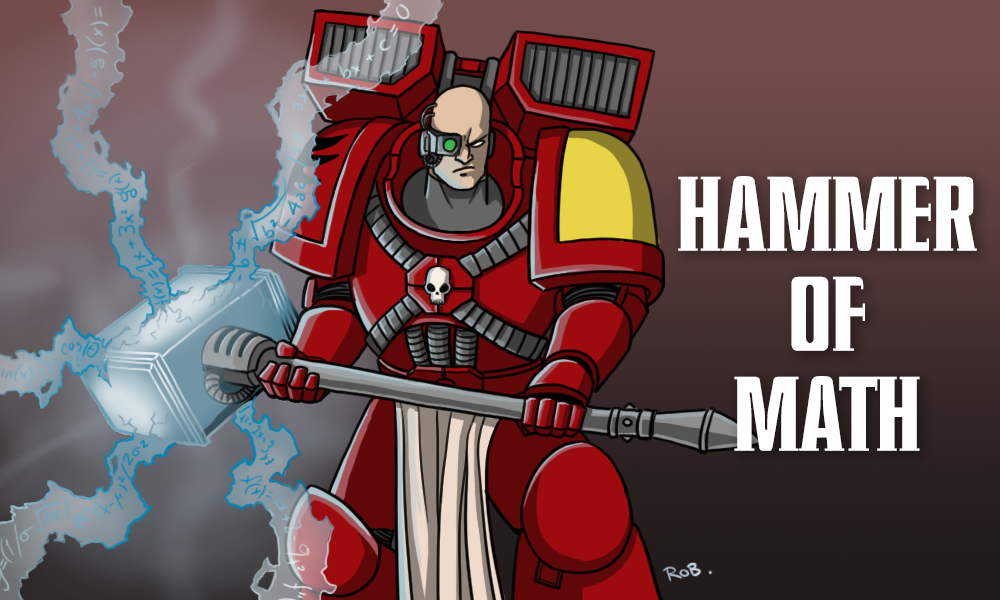The portents of the Psychic Awakening continue to be ominous, and the potential for a new wave of Warp-influenced abilities and powers threatens to overwhelm the galaxy and/or overturn the meta. Knowing what to expect from the Psychic phase (or for Tau players, how long of a break you can take before you need to pay attention again) can be extremely important. In today’s Hammer of Math, Kevin Genson discusses the Psychic tests and the various ways that Mortal Wounds can be inflicted on your enemies.
The Psychic Phase
The Psychic phase occurs between the Movement and Shooting phases. Many players (particularly robot-lovers such as Ad Mech, Tau, or Necrons) may have completely forgotten about this phase. Each psyker has a list of powers that they can use, a specific number of powers they can cast each Psychic phase, as well as a number of attempts to Deny the Witch. The sequence is as follows:
- Choose psyker and power.
- Make Psychic test by rolling 2d6 and scoring equal to or greater than the warp charge value of the power.
- Resolve any Perils of the Warp; on a double 1 or double 6 the psyker suffers d3 mortal wounds. If the psyker dies the power automatically fails, and units within 6″ ALSO take d3 mortal wounds.
- One enemy psyker within 24″ can attempt a Deny the Witch test by rolling greater than the Psychic test on 2d6.
- Resolve the psychic power.
The probability of success on 2d6 is well characterized and provided on the chart below. I’ve also added the probability curve for scenarios where the player can re-roll all 1s (using the Knowledge is Power Successor Trait), has a CP re-roll, the ability to re-roll any die, as well as the ability to re-roll both dice on a failure. Note that for the ability to re-roll any number of dice (such as the Runes of the Farseer) the assumption is that any die less than 4 is re-rolled unless the target power was an 11 (re-roll anything less than 5) or 12 (re-roll anything less than 12).
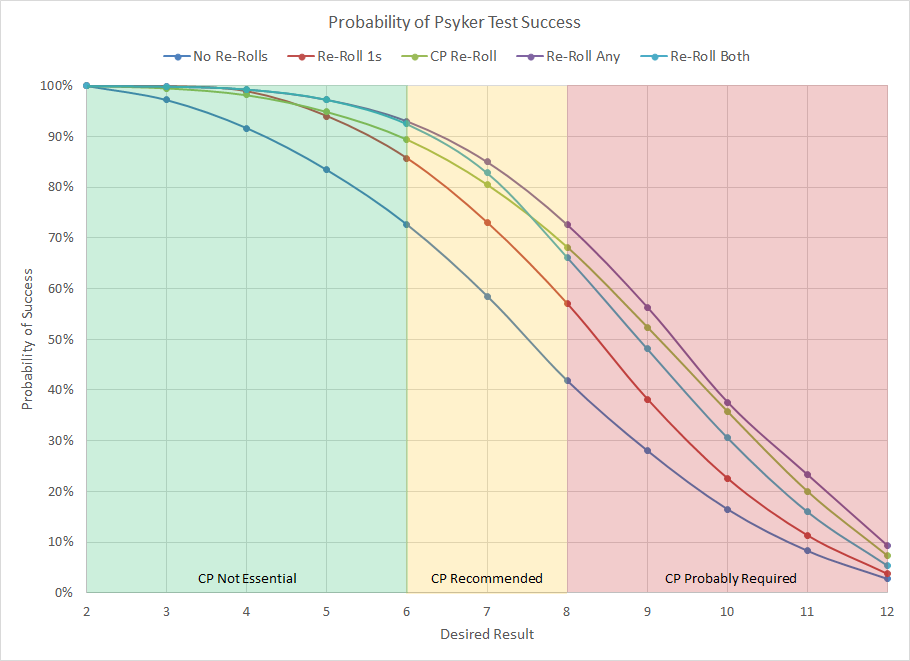
When two dice are rolled and added together the most likely result is 7 (58% of the time), so as you can expect the curve shifts drastically around that point. For lower warp charge powers with values of 6 or below you have a very good chance of success without needing a command point. On the other hand powers with a warp charge of 8 or greater have a sufficiently low chance of success that it is likely in your best interest to keep a command point in reserve should it be a crucial power. It’s important to understand the rules surrounding re-rolls. In addition to never being allowed to re-roll any die more than once, per the latest FAQ you must declare all re-rolls simultaneously. As an example, you’re not allowed to use Runes of the Farseer or Knowledge is Power to re-roll one die and then apply a Command Point to re-roll the other die based on the result.
Modifiers to Psychic tests are fairly simple; because there are no multipliers or other effects you can determine the probability by shifting the warp charge. For example Smite has a warp charge value of 5 the first time it’s cast. Normally this would be an 83% probability of success, but if Tigurius is casting it with his Hood of Hellfire then the warp charge is effectively 4 and the probability is now 92%. If a fellow Ultramarine cast Empyric Channeling on him the effective warp charge would be 2 and his probability of success would be 100%. Note that although a double 1 is not an automatic failure, even if the effective warp charge of the power is 2 it can still fail if the Psyker gets a double 1 or double 6 and dies due to Perils of the Warp. In most cases the probability of getting a Perils of the Warp result is around 6%.
Deny the Witch
Every Psyker has the ability to counter a psychic power cast within 24″ through the use of a Deny the Witch test. If the resisting Psyker rolls higher than the result of the Psychic test on 2d6 then the power is denied. This does not count as failing the Psychic test for effects such as the Reliquary of Gathalamor. Space Marines Librarians can be particularly effective at using Deny the Witch as they all receive a +1 bonus within 12″ from their psychic hood. As with casting powers, Psykers are limited to the number of Deny the Witch tests specified in their profile.
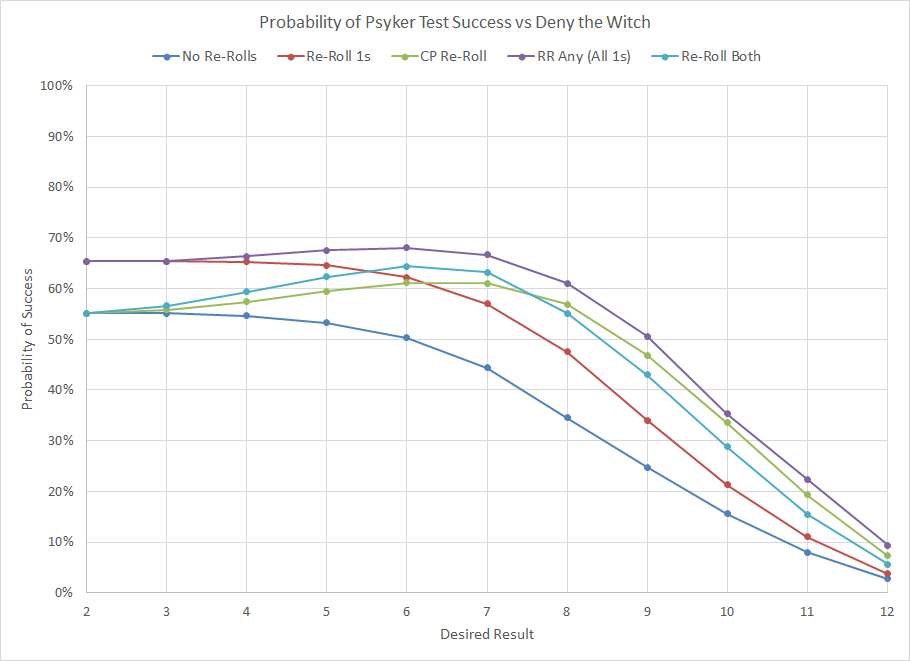
The curves above show the probability of success for a contested Psyker test under a variety of conditions. The influence of Deny the Witch is significant for all warp charge values of less than 10, reducing the probability of success for all unmodified Psyker tests to a maximum of 55%. The ability to re-roll values of 1 is particularly important, as it has a significant chance of improving the outcome and preventing a denial with no penalty to the Psyker. The slight increase in the purple line (re-roll any dice including all 1s) in the middle warp charge values can be attributed to the strategy used. For that particular condition I assumed that the player would use the same strategy as in the previous chart and only re-roll values below 4 if the Psychic test was a failure, but that they would also re-roll all values of 1 since there’s no penalty. This means that in situations where the player had a low warp charge they may not necessarily re-roll any dice but still have a low value.
This opens up an interesting question; is there an optimal strategy surrounding the use of re-rolls and Psychic tests? Aside from the obvious case where one of the results is a one, are there conditions where it is preferable to re-roll one or more dice, even on a successful test, so that your overall probability of success increases? Well we know from probability that the expected value of a d6 roll is 3.5, meaning that on average any roll of 3 or less has a better chance of improving than getting worse, so one strategy could be to re-roll any die that’s 3 or less. It turns out that this is indeed an optimal strategy.
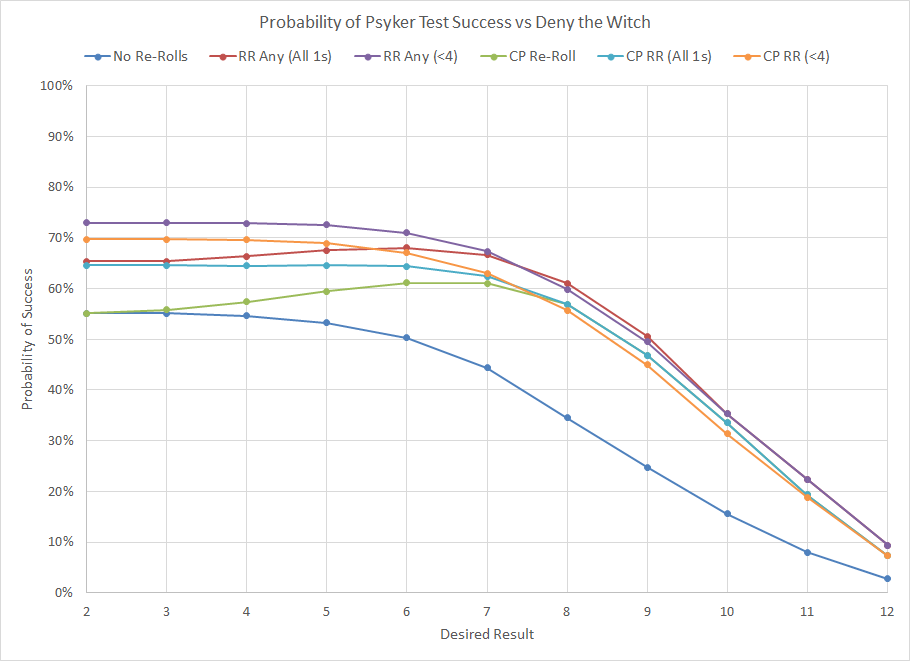
When the desired result is less than 8 (the vast majority of warp charge values), the optimal strategy is to re-roll every die that comes up with a value of 3 or less. This applies to scenarios were you can re-roll both dice or only one using a command point or some other ability. Depending on the warp charge the improvement in probability can be as much as 23%. For target values of 8 or higher the optimal strategy is to only re-roll dice on a 1, although the difference in probability is minimal. I also explored only re-rolling values of 1 or 2 but improvement in probability was less than re-rolling all values of 3 or less.
Psychic Focus

One major limitation on the Psychic phase is the Psychic Focus rule, which limits the number of times a power can be attempted to only once per turn unless the power is Smite. Smite is also constrained by increasing the warp charge value by +1 for every prior attempt. 40K enthusiasts may recall from the beginning of 8th edition when “Smite Spam” was prevalent and hordes of psykers would eliminate nearly any threat with a deluge of warp power. Since Psychic Focus was introduced Smite Spam has largely disappeared, but the power is still prevalent.
Abilities Related to Psychic Tests
Several factions have access to unique characters, Relics, Stratagems, or powers that have the ability to influence Psychic tests.
Agents of the Imperium
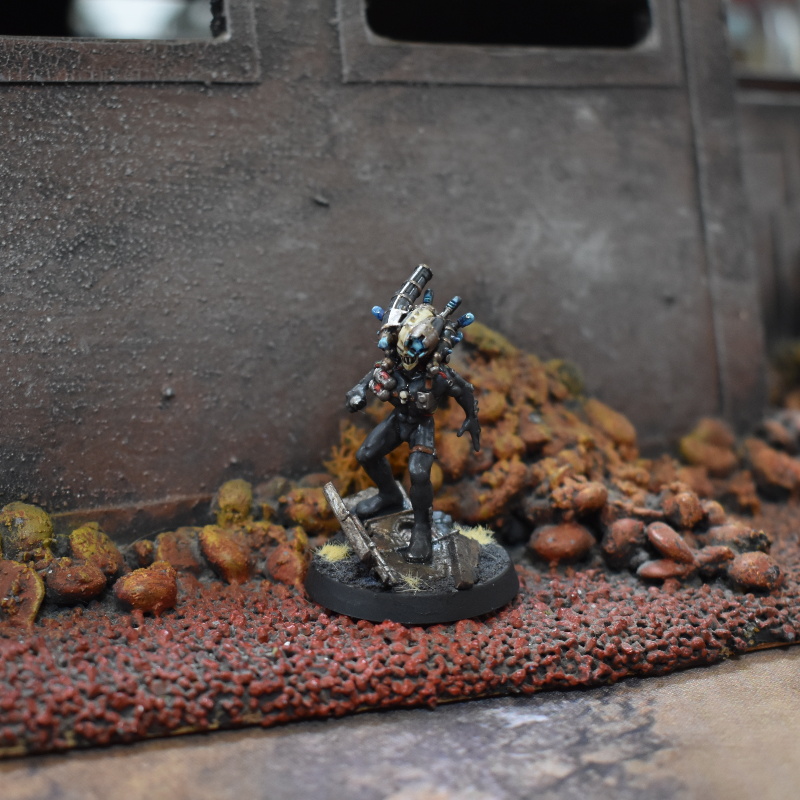
The quintessential psyker killer, Culexus assassins are completely immune to psychic powers and subtract 2 from all Psychic tests and Deny the Witch tests from ALL Psykers, friendly or enemy. Oddly enough they have no Stratagems related to neutralizing powers.
Sisters of Silence all have the Psychic Abomination ability, which forces enemy Psykers to subtract 1 from any Psychic tests and Deny the Witch tests they take for each unit with the ability within 18″, up to a maximum penalty of -4. Unlike the Culexus assassin this effect only applies to enemy Psykers.
Inquisitor Greyfax and Inquisitor-Lord Hector Rex gains a +1 to all Deny the Witch tests. Inquisitor Karamazov and unnamed Inquisitors that are not psykers can ignore the effect of any psychic power that targets them by beating the result of the Psychic test on 2d6. This is not a Deny the Witch test and the power still applies to other units that were targeted.
Space Marines
Space Marines have an extensive collection of options for Psychic tests, and when properly used can be effective at shutting down opposing psykers. All Space Marine Librarians have access to the Psychic Hood which gives them a +1 to Deny the Witch tests at 12″ range. Space Marine Successor Chapters can take the Knowledge is Power Chapter Tactic to re-roll all die rolls of 1 in Psychic tests and Deny the Witch tests. Although not strictly for the Psychic phase, Space Marine Successor Chapters can also take the Warded Chapter Tactic to get a 5+ save against mortal wounds. Both of these Successor Tactics are heavily specialized and likely less than optimal for competitive play.
All Space Marines have access to two Relics. The first is the Reliquary of Gathalamor, which forces a -1 penalty on all enemy Psychic tests that occur within 18″. On a 4+ the Reliquary also deal d3 mortal wounds to any enemy psyker in range that fails its Psychic test. A failed Psychic test specifically means that the 2d6 roll did not reach the warp charge; a successful Deny the Witch test does not count as a failed Psychic test. The second relic is the Tome of Malcador, which allows a Librarian to know one additional psychic power from any discipline that they have access to. Because the Relic specifies “access” this means that an Ultramarine Librarian with powers from the Indomitus discipline could use the Tome to gain another power from the Librarius discipline.
Ultramarines have access to two additional ways of improving Psychic tests. The first is Tigurius, who gains a flat +1 to Psychic tests and Deny the Witch tests thanks to his Hood of Hellfire. The second is the Empyric Channeling power from the Indomitus discipline, which has a warp charge value of 5 (83% chance of success) to give a +2 bonus to all Psychic tests and immunity to Perils of the Warp on double 1s or 6s. Empyric Channeling requires a second Librarian to work as it must be cast on “one other” friendly Ultramarines Librarian. Ultramarines Captains and Chapter Masters can also take the Sanctic Halo to get a 3+ invulnerable save and the ability to deny one psychic power per phase.
Iron Hands have access to the Will of Iron trait which allows the Warlord to use Deny the Witch once per phase. If a Librarian is the warlord then he can attempt to deny one additional power per phase. Iron Hands also have the ability to use the Souls of Iron Stratagem for 1 CP. This Stratagem allows an Iron Hands unit within 24″ to “resist” a psychic power on a 4+, and this occurs after a Deny the Witch attempt has been made.
White Scars Librarians have access to the Mantle of the Stormseer relic, which gives them a +1 to cast powers from the Stormspeaking discipline.
Salamanders have The Tome of Vel’cona, which gives them a +1 to cast powers from the Promethean discipline and provides an extra power. So it’s basically the Tome of Malcador and the Mantle of the Stormseer combined, making it one of the most powerful Relics for psykers available.
Imperial Fist Librarians can take The Bones of Osrak, which allows the bearer to re-roll the result of a Psychic test to manifest a power from the Geokinesis discipline.
Dark Angels, Blood Angels, and Deathwatch all have access to the Empyric Channeling Stratagem, which enables the player to spend 1 CP to manifest a Psychic power with a +2 bonus. This can occur in any Psychic phase, but requires the player to have at least three Librarians from the same faction which is fairly rare for those factions.
The Space Wolves codex contains many Stratagems that are useful in bolstering the Tempestas discipline. Their named Librarian, Njal Stormcaller, gets a +1 bonus to all Psychic tests, a +1 bonus to Deny the Witch tests against targets within 12″, and can re-roll one failed Deny the Witch test in each enemy Psychic phase. For 1 CP Space Wolf characters can use Talismanic Shield to gain the ability to deny one psychic power. If the Space Wolf player brings three psykers then when one manifests the Living Lightning ability the player can spend 1 CP to use the Living Storm Stratagem to make the power deal 1d6 mortal wounds instead of 1d3. Finally, after a Space Wolf Librarian successfully manifests a psychic power the player can spend 3 CP to use Cloaked by the Storm to force the opponent to subtract 1 from all hit rolls for ranged attacks that target friendly Space Wolf units within 6″.
Blood Ravens have the Knowledge is Power Chapter Trait (along with the significantly less useful Stalwart trait which ignores unmodified wound rolls of 1 or 2), and they also have access to the Chief Librarian Stratagem. For 1 CP a Librarian will get access to an additional power from their chosen discipline (which is worded differently than the Tome of Malcador) and can also deny one additional power per phase. As no Successor Chapter has been specified for Blood Ravens they can choose which Chapter to be a Successor of and gain access to the relevant disciplines and stratagems. I don’t know why you would want to do it, but you could potentially take a Blood Ravens Chief Librarian, become an Iron Hands Successor, and make him a Warlord with the Will of Iron trait to deny four powers each turn. At that point you might as well have the Librarian “borrow” the Reliquary of Gathalamor and see how many psykers you can kill in a single battle.
Grey Knights
All Psykers in a Grey Knight detachment get a +1 to to Psychic and Deny the Witch tests. Grey Knight Warlords can use the Lore Master trait to get an additional power from the Sanctus discipline. Grey Knights also have access to three Stratagems related to Psychic tests. The first is Mental Focus, which allows a Grey Knight Psyker to cast an additional power for 1CP. The second is Psychic Channeling, which costs 1CP and allows the Psyker to roll three dice and pick the two highest rolls for a Psychic test. The third is The Aegis, a 2CP Stratagem which allows a Psyker or Grey Knight vehicle to use Deny the Witch on a psyker within 24″ and roll three dice and pick the two highest.
Thousand Sons
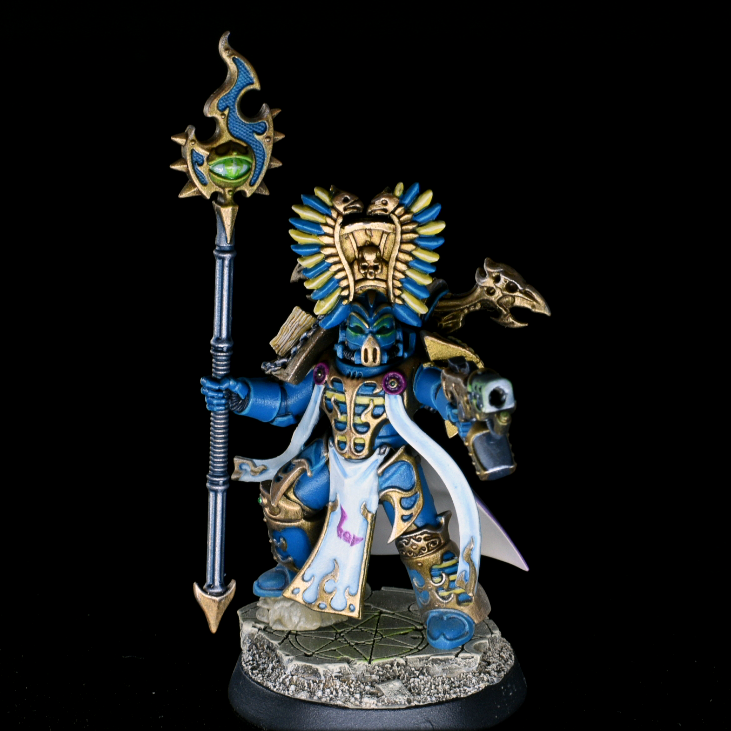
Naturally an entire legion dedicated to magic gets a bonus to it. Ahriman gets a flat +1 to Psychic and Deny the Witch tests, while Magnus the Red gets a bonus based on his wounds remaining (+2 at top bracket). Warlords with the Lord of Forbidden Lore trait know one additional power, while those with the High Magister trait get a +1 bonus to all Psychic tests. Thousand Sons also can use The Great Sorcerer Stratagem to manifest an additional power for 1CP, and the Cabalistic focus allows you to spend 1CP to add 2 to a Psychic test manifested by a Thousand Sons psyker who is within 6″ of at least two other friendly psykers. Every Psychic phase a Thousand Sons psyker can spend 1 CP to replace a psychic power with another from the Dark Hereticus, Discipline of Change, or Discipline of Tzeentch disciplines. And finally a particularly adventurous (and lucky) Thousand Sons Character can get a +1 to Psychic tests by slaying an enemy character, vehicle or monster, using the Boon of Tzeentch Stratagem for 1 CP, and then rolling a 6 on the resulting table.
Chaos Daemons
Kairos Fateweaver (who can manifest three powers) and Lords of Change get a bonus to Psychic tests depending on their wounds; at full top bracket they get a +2 bonus. Fateskimmers ridden by Chanting Horrors force a -1 penalty on all Psychic tests made by enemies within 9″. Tzeentch Daemon Psykers can manifest an additional power for 1CP using the Magical Boon Stratagem, and for 2CP the Locus of Conjuration ability allows all Psychic tests made by friendly Tzeentch Daemons within 6″ of a character to be re-rolled. Note that Magnus and Thousand Sons Daemon Princes are both Tzeentch Daemons, so there’s some really fun synergy available between the two books. Tzeentch Daemon Warlords also get access to the Boon of Sorcery trait which gives them a +1 bonus to Psychic tests. The Blue Scribes are also a fun option. They automatically manifest one random power from the Tzeentch discipline in the player’s Psychic phase which does not take a Test and cannot be denied. They also force a -1 penalty to Psychic tests for enemy psykers within 12″, and if the test is failed the psyker loses that power and cannot attempt to manifest it again.
Aeldari
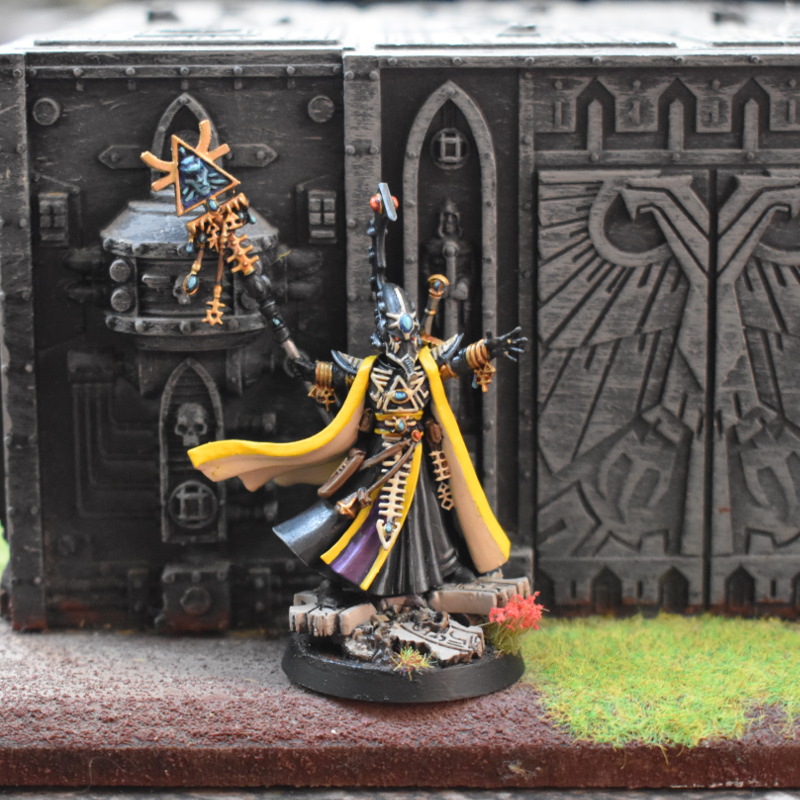
The Eldar have a lot of Psykers and abilities, and Psychic Awakening promises to give them even more. All Farseers have the Runes of the Farseer ability which allows them to re-roll any number of dice used in a Psychic test or Deny the Witch test once per phase. Craftworld Aeldari also have access to the Seer Council Stratagem which, for 1 CP, gives a +1 bonus to all Psychic tests taken for a Farseer and Warlock within 6″ of each other. Farseers also have access to the Unparalleled Mastery Stratagem to cast an additional psychic power for 1 CP, and Craftworlds Warlords can use the Seer of the Shifting Vector trait to re-roll a single hit roll, wound roll, Psychic test, or Deny the Witch test once per battle round. Eldrad Ulthran (who can cast three powers per turn) has the Spiritlink ability, which gives him a rolling +1 to Psychic tests after his first successful Psychic test – i.e. you get +1 to the next power as long as you pass the test for the previous one.
Yvraine adds 1 to all Psychic and Deny the Witch tests, and every time an Aeldari psyker dies within 6″ of her she can generate another power from the Revenant discipline. All Ynnari psykers can benefit from the Acolyte of Ynnead Stratagem, which gives a +3 bonus to a Psychic test for a power from the Revenant discipline if any enemy units were destroyed in that Psychic phase.
The Psychic Awakening book has provided new Craftworld Attributes for players to experiment with, one of which benefits plays. Children of Prophecy allows for every die roll of 1 to be treated as a value of 2. The end result is an ability which significantly improves the probability of success for low difficulty powers (a warp charge value of 4 is guaranteed), but which is less effective than abilities which include re-rolls. For values between warp charge 5 and warp charge 8 the improvement in success is roughly 5%.
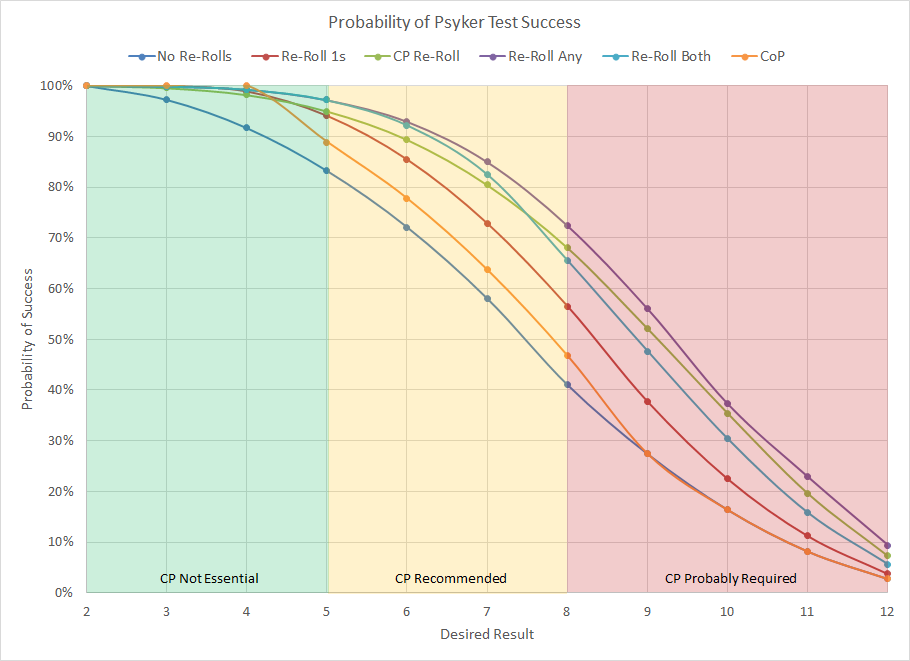
Psychic Awakening also provided the Runes of Fortune discipline, which provides alternative powers to Smite. Focus Will, a warp charge 6 power, allows a model within 6″ to get a +2 bonus when taking Deny the Witch tests. This provides a significant benefit for shutting down psychic-heavy armies.
Orks
Ork WAAAGH! magic is bolstered by the presence of nearby orks. Ork Weirdboyz get a +1 bonus for every 10 non-Gretchin Ork models (including vehicles) within 10″ of the caster, up to a maximum bonus of +3. The downside is that all of this extra power is that on a result of a 12+ the caster experiences Perils of the Warp. Where an unmodified casting has a typical probability of getting a Perils of the Warp of 6%, Orks have an 11% chance with a +1 bonus, 19% chance with a +2 bonus, and a 31% chance with a +3 bonus. Fortunately Weirdboyz have 4 wounds so the first attempt won’t kill them unless they’re already injured.
Tyranids
Casting in the presence of the Hive Mind is generally considered a bad idea. Many elite Tyranids have the Shadow in the Warp ability, which imposes a -1 penalty to any enemy Psyker which attempts to manifest within 18″. Neurothropes enable Zoanthropes (which includes the Neurothrope) within 6″ to re-roll any value of 1 for Psychic tests. Finally Kronos Hive Fleets can spend 1 CP to utilize The Deepest Shadow Stratagem and force an enemy Psyker within 24″ of a Kronos unit to only roll a single dice for the Psyker test.
Genestealer Cults
The harbingers of the hive mind have more than a few tricks up their (many) sleeves. Genestealer Cult units within 6″ of a Magus can attempt to use Deny the Witch on a single psychic power that targets them each Psychic phase. A Patriarch or Magus can bring up to two Familiars that can each allow the Magus to cast an extra power once per game, and they can replace a Familiar with The Crouchling Relic to know an additional power from the Broodmind discipline and get a +1 to all Psychic tests for powers from that discipline. This bonus lasts for as long as The Crouchling is alive, making it one of the few relics that can actually be lost during a game.
Smite
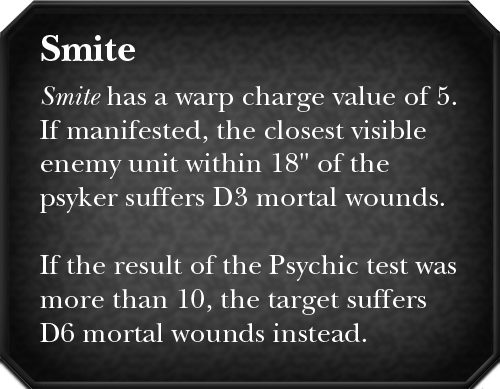
If you face Psykers, you will face Smite. This power is universally known by every Psyker, and as such it is generally the standard by which other powers which deal mortal wounds are compared. Clever gamers can carefully position their Psykers to ensure that a desired target is closest and therefore vulnerable, and appropriately screening your valuable characters from threats such as Hemlock Wraithfighters and jump pack Librarians is a critical skill. Thanks to the Psychic Focus rule, the difficulty of manifesting Smite increases with each subsequent attempt. The probabilities of success on subsequent Psychic tests are 83%, 72%, 58%, 42%, 28%, 17%, and then finally 8%.
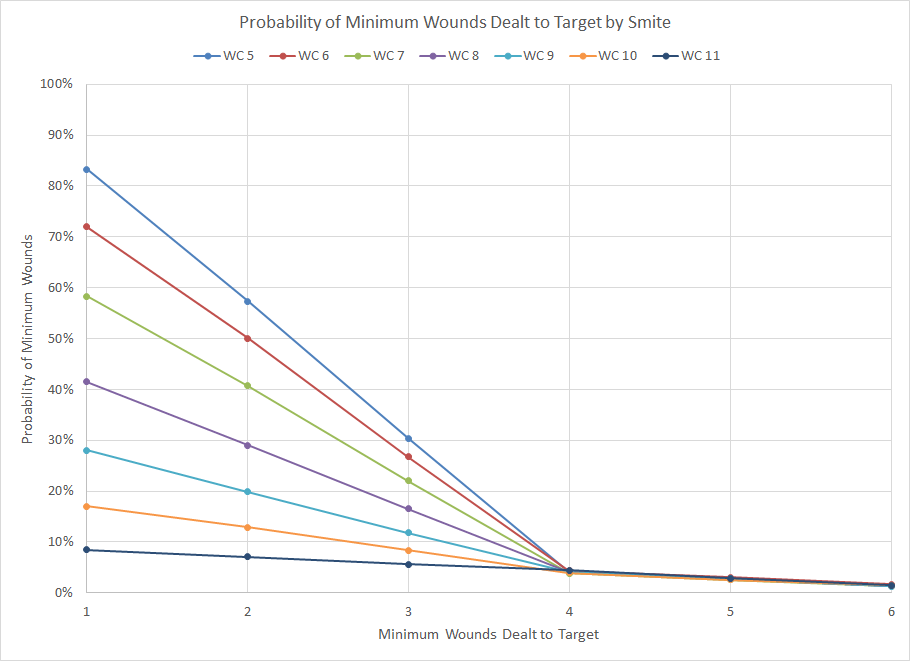
The returns diminish quickly; after the third attempt the probability of getting any result falls below 50% due to the increased warp charge. Since a Smite can only deal 1d6 damage on a Psychic test of 11 or 12 the probability of dealing 4 or more wounds is the same regardless of the difficulty; approximately 5%. These values seem low, but it should be noted that mortal wounds bypass nearly every defense the target has with the exception of Feel No Pain. When applied to something like a fully protected Iron Hands Leviathan 2 mortal wounds is the equivalent of a traditional attack that deals 12 wounds before the save and damage reduction. The Smite curves are also useful in assisting us in evaluating the many other powers which deal mortal wounds. We’ll examine that in a future article.
Influence of Modifiers
Modifiers are particularly powerful for Smite as they increase both the probability of the power going off and also the probability of the attack dealing 1d6 wounds by achieving an 11 or better on the Psychic test. Properly applied this can result in a significant number of mortal wounds dealt to the target, particularly when the player is able to position a unit with a bonus and get off multiple attacks in sequence.
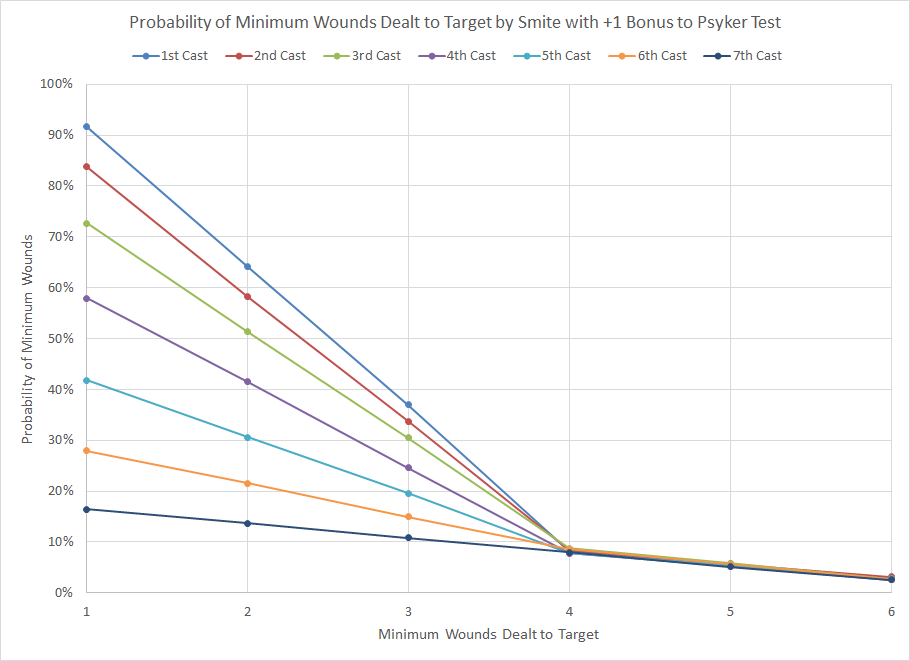
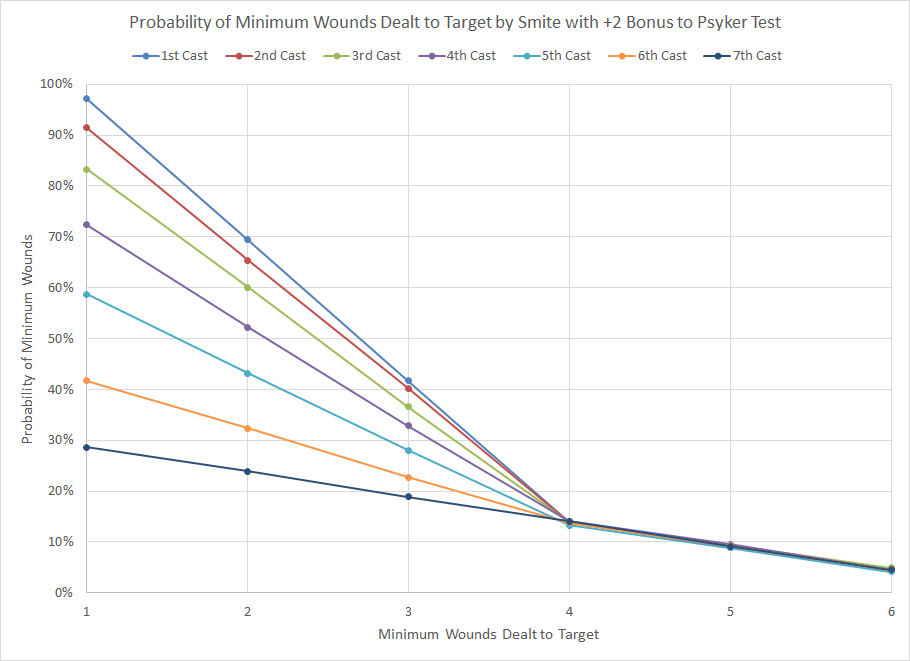
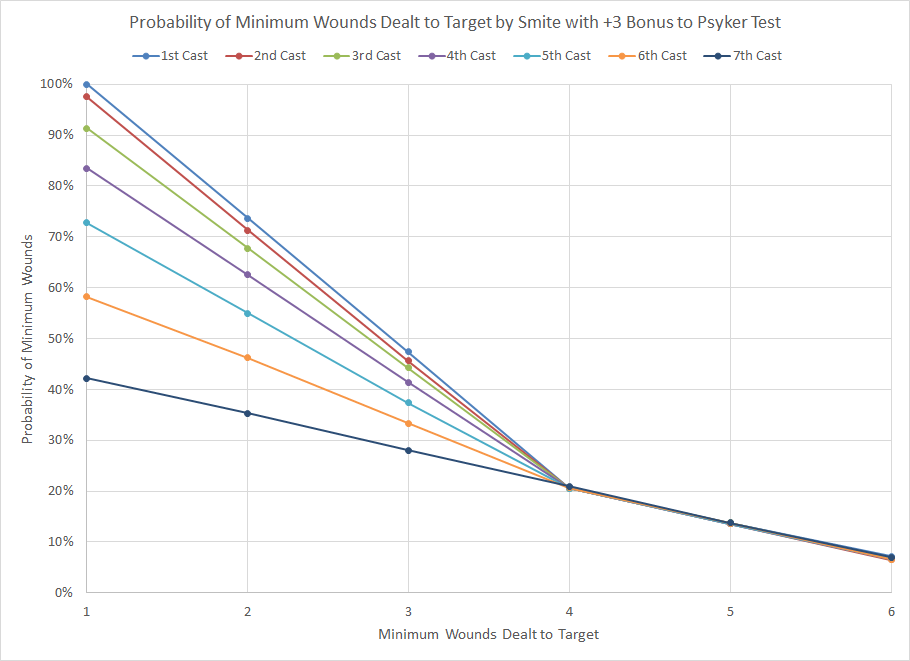
As expected the bonuses provide a significant improvement in the probability of success, improving both the probability of successive castings as well as the damage dealt. The fourth casting with a +3 bonus has an equivalent chance of success to the first casting of an unmodified roll while also improving the chances of dealing 4 or more wounds from 5% to 20%. This effect will also apply to any other power which has superior results with higher Psyker tests results, such as Cacophonic Choir from the Slaanesh Daemon discipline or Trephination from the Dark Angel’s Interromancy discipline.
Conclusions
Psychic powers offer a powerful means of inflicting damage and controlling the board. The math associated with the basic Psychic test is fairly simple, but as with most things 40K the presence of modifiers and the Deny the Witch test can significantly alter the outcome. Players who find that their game heavily depends on the success of a single Psychic test are advised to keep at least one Command Point in reserve. The presence of other Psykers on the board can pose a major threat due to the Deny the Witch rule. The optimal strategy for successfully manifesting a power in the presence of an enemy Psyker is to re-roll die rolls of three or less for warp charges of 7 or less, and re-roll on die rolls of 1 for any higher difficulties. Smite is one of the most common and efficient powers available, and modifiers provide a significant benefit that can help overcome the limitations on Smite imposed by the Psychic Focus rule. In a future article we’ll cover the efficacy of the various Smite-like powers.
It’s entirely possible that there may be errors in this article. If you spot any, or have any other feedback (such as questions or ideas for future Hammer of Math articles), hit us up at contact@goonhammer.com, message us on our Facebook Page, or leave a comment below and we’ll do our best to respond.
